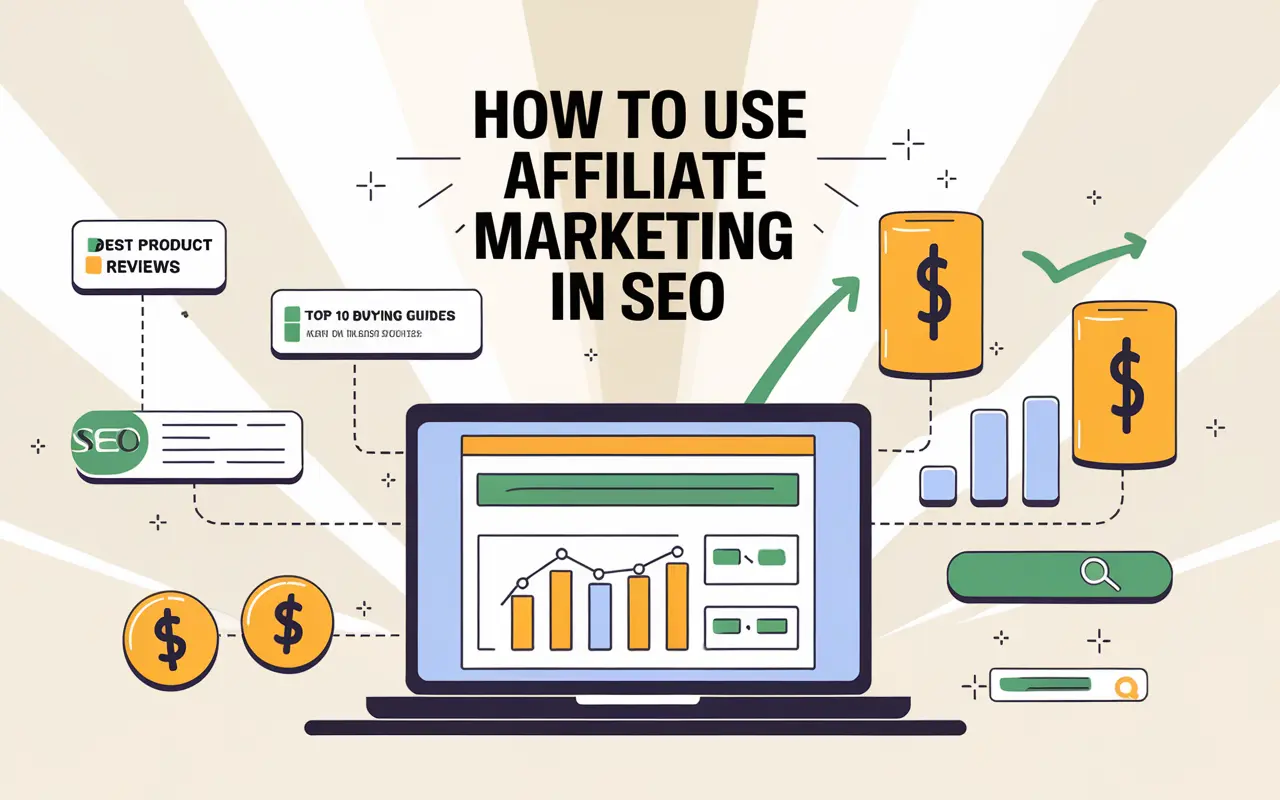Understanding Affiliate Marketing in the Context of SEO
Affiliate marketing in SEO involves promoting third-party products or services through your website using affiliate links while simultaneously applying SEO strategies to increase organic visibility and drive more quality traffic. When done correctly, it can lead to sustainable revenue, improved authority, and higher organic search rankings.
This strategy merges content marketing, backlink generation, and user intent targeting—all vital components in a successful SEO strategy. Affiliate SEO also drives business growth by monetizing blog traffic and establishing trusted relationships with readers and search engines via high-quality, useful content.
Key Takeaway
Affiliate marketing, when combined with SEO, drives qualified traffic, creates link opportunities, builds content authority, and enhances revenue potential through strategic organic visibility.
Why Affiliate Marketing Matters for SEO Success
Effective use of affiliate marketing within SEO frameworks can positively impact multiple SEO metrics including:
- Traffic Generation: High-quality affiliate content can pull in organic visitors searching for solutions.
- Backlink Growth: Well-crafted affiliate content is often shared and linked to, improving domain authority.
- Topical Authority: Creating rich, helpful content around affiliate topics establishes topical depth, which search engines value.
- User Experience: SEO-optimized affiliate pages answer user intent, reducing bounce rate and improving engagement.
Affiliate SEO especially benefits bloggers, niche site operators, info product creators, and brands that employ content-driven strategies to rank and monetize simultaneously.
Best SEO Practices for Affiliate Marketing
Here are proven techniques to improve your affiliate site’s SEO without crossing ethical or ranking red lines:
- High-Intent Keyword Research: Target buyer-intent keywords like “best,” “review,” “vs,” and “guide to.” Tools: Ahrefs, SEMrush, Ubersuggest.
- Unique, In-Depth Content: Avoid generic reviews—Google favors original experience, E-E-A-T signal-rich articles.
- Proper Affiliate Link Use: Use “rel=nofollow” or “rel=sponsored” for affiliate links to comply with Google guidelines and avoid penalties.
- Optimize Title Tags & Meta Descriptions: Write compelling, keyword-optimized meta data to improve CTR and rankings.
- Internal Linking: Use supporting content (guides, blogs) to internally link to affiliate content and enhance crawlability.
- Page Speed & Mobile Optimization: Use tools like Google PageSpeed Insights to ensure your affiliate pages load fast and are mobile-friendly.
How Affiliate Marketing Works in an SEO Framework
Affiliate marketing SEO follows a workflow that emphasizes high-quality content, user intent fulfillment, and strategic monetization. Here’s how it unfolds:
Step 1: Niche Selection & Audience Targeting
Identify niches where affiliate programs are profitable and you can build topic authority organically. Use SEO research to study search volume, competition, and trends.
Step 2: Content Strategy Development
Outline a content map that includes product reviews, tutorials, comparison articles, case studies, and how-to guides—all focused on user questions and search intent.
Step 3: Optimization & Monetization
Integrate affiliate links naturally within the content. Ensure pages are optimized for on-page SEO—URL structure, H1-H3 tags, alt text, and schema markup.
Step 4: Promotion & Link Building
Market content via email marketing, outreach, and guest posting to gain backlinks and social signals—which improve SEO KPIs like authority and traffic.
| Stage | SEO Activity | Affiliate Benefit |
|---|---|---|
| Keyword Research | Find high-converting queries | Targets buying-intent users |
| Content Publishing | Create helpful, optimized content | Drives organic traffic & trust |
| Link Optimization | Use proper affiliate tagging | Complies with Google policy |
| Promotion | Backlinks & social shares | Boosts authority & rankings |
Case Study: Boosting Traffic & Revenue with Affiliate SEO
Problem: Low Traffic and Underperforming Affiliate Pages
A niche blog focusing on health supplements was seeing minimal affiliate sales and poor organic traffic despite multiple review pages.
Solution: Implementing Targeted SEO Affiliate Marketing
We audited content structure, optimized for buyer-intent keywords, rewrote reviews to include personal experience, optimized all technical SEO issues (including speed, title tags, schema), and launched backlink outreach campaigns.
Results: 150% Increase in Organic Traffic and 3x Affiliate Earnings
Within 4 months, the site saw a 150% growth in organic traffic, increased backlink domain diversity by 67%, and tripled its monthly affiliate revenue through higher-converting content and better rankings.
Common Mistakes to Avoid in Affiliate SEO
- Duplicate Content: Reusing manufacturer or product descriptions leads to content penalties and rank drops.
- Overusing Affiliate Links: Keyword-stuffing affiliate links creates a poor user experience and may trigger spam signals in Google.
- No Transparency: Failing to disclose affiliate relationships affects trust and may violate FTC or GDPR regulations.
- Ignoring E-E-A-T Signals: Not showing author expertise or experience in the review content can make it less trustworthy for Google’s algorithm.
Related SEO Terms
- Off-Page SEO: External optimization techniques such as backlink building—critical for affiliate SEO success.
- SEO Audit: Evaluates technical and content-level SEO issues, which impact affiliate performance.
- Content Marketing: Strategy used to attract, engage, and convert users through valuable content—key for affiliate SEO.
FAQs About Using Affiliate Marketing in SEO
Affiliate marketing only hurts SEO if links are applied incorrectly (without “nofollow”) or if the site contains thin, low-quality content. Following best practices prevents penalties.
Look for established affiliate networks with niche relevance, provide quality products, and offer transparent tracking and tools like shareable widgets. Examples include ShareASale, Impact, and Amazon Associates.
Comparison guides, product roundups, how-to articles, and personal reviews tend to perform well. These content types meet buyer intent and drive conversions.
Yes, provided it is human-edited, demonstrates value, and avoids plagiarism. Google rewards content that helps users, regardless of who wrote it.
Conclusion: Integrate Affiliate Marketing into Your SEO Strategy
Affiliate marketing and SEO are a powerful duo that can grow visibility, revenue, and trust—all simultaneously. By focusing on user-intent-driven content, compliance with link policies, and continuous optimization, affiliate SEO becomes a long-term asset—not just a monetization tactic.
Ready to upgrade your SEO game with affiliate marketing? Explore our complete SEO guides and discover tools to power up your campaign.






